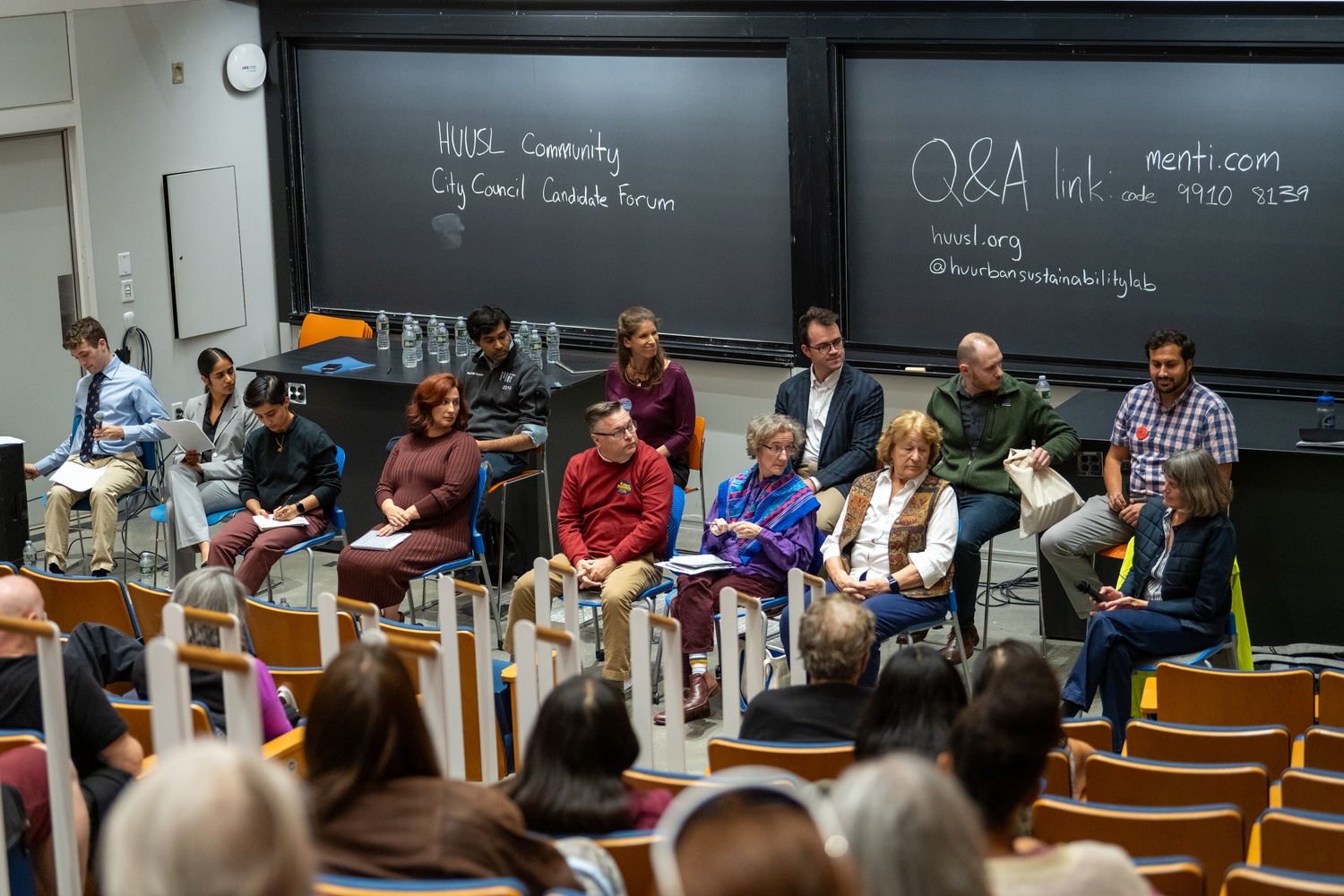
News
Summers Will Not Finish Semester of Teaching as Harvard Investigates Epstein Ties

News
Harvard College Students Report Favoring Divestment from Israel in HUA Survey

News
‘He Should Resign’: Harvard Undergrads Take Hard Line Against Summers Over Epstein Scandal

News
Harvard To Launch New Investigation Into Epstein’s Ties to Summers, Other University Affiliates

News
Harvard Students To Vote on Divestment From Israel in Inaugural HUA Election Survey
City Council Candidates Disagree on Current Housing Crisis in Cambridge

Cambridge City Council candidates gathered at the Science Center on Tuesday to pitch their policies on housing, transportation, and relations with the federal government in the final stretch before election day.
As in previous forums, the Multifamily Housing Ordinance passed earlier this year — which eliminated single-family zoning across the city — was one of the biggest issues, with nearly every contender referencing the ordinance during the housing portion of the debate.
While the ordinance, which bans zoning that restricts new housing to single-family homes, has found critics among several challengers in the election, almost all were supportive at Tuesday’s forum.
“If you can’t support an additional 10 feet to help address our housing crisis, you don’t support addressing our housing crisis,” incumbent candidate Marc C. McGovern said.
The ordinance changed building height restrictions from four to six stories as well, in another part of a broader effort to facilitate more housing development, and ultimately push down historically high rents in Cambridge.
The candidates at the forum widely agreed that the most vulnerable residents in Cambridge should be prioritized in housing reform, as many of the city’s most discussed housing policies this election cycle have done more to target a general increase in housing supply — which may not immediately aid lower income residents struggling with rent.
Still, 20 percent of the units in any six-story buildings constructed under the new ordinance must be income-restricted.
“Middle income housing is what we really desperately need, because we have put a lot of resources behind deeply subsidized housing,” incumbent candidate Patricia M. Nolan ’80 said.
Hosted by the Harvard Undergraduate Urban Sustainability Lab in a Science Center lecture hall, the forum was also a milestone for a relatively new club at Harvard that has sought to play a greater role in Cambridge politics, particularly around bike lanes and housing policy.
HUUSL was founded two years ago as a club for urban policy and has recently mobilized students on campus to advocate for an urban studies secondary for undergraduates and helped the city in allocating a small participatory budget. But Tuesday’s forum is its first time running such a public debate attended by local politicians.
Also during the housing section of the forum, candidates cited Cambridge’s low residential and commercial property tax – which is nearly half the rate of Boston’s tax — as the most realistic way to raise revenue for housing affordability.
Next year, the commercial tax rate is expected to grow by 22 percent, a significant increase that has sparked controversy among local businesses. Stanisalv Rivkin, a challenger in the race, endorsed that tax hike as necessary to continue the city’s housing agenda.
“We can’t solve affordability if we’re not willing to sacrifice and if we’re not willing to invest in our community to the same degree that other communities are investing in theirs,” Rivkin said. “And that’s the honest answer of how to generate this revenue.”
Councilor Catherine Zusy, an opponent of the multifamily housing ordinance, maintained her longtime criticism of the policy.
“I understand the need to build more housing, but I was the lone vote against the multifamily housing ordinance, because mostly it’s going to produce luxury units,” Zusy said. “It’s going to displace the very people it was meant to serve.”
As candidates discussed their positions on responding to a more hostile federal government, challenger Ayah Al-Zubi ’23 called for keeping the University in check as it cut union positions in response to intense funding pressures from the Trump administration.
“Harvard’s a complicated topic,” Al-Zubi said. “We have to support them and also hold them accountable especially right now when they’ve cut their union members.”
Want to keep up with breaking news? Subscribe to our email newsletter.
